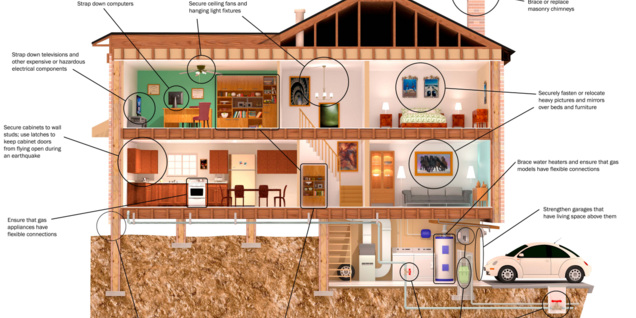Posted
Preparing your home for disaster is another important step in emergency preparedness. It will give you a safe place to stay or return to after a natural disaster. There are several ways you can prepare your home and property – doing a home hazard hunt, getting additional insurance, making copies of your important documents, and keeping the space around your home free from anything that might burn.
Home Hazard Hunt
Your home can be dangerous after a disaster, especially an earthquake. Read about how you and your family can find and fix areas of your home that might be damaged in an earthquake and that might injure family members during an earthquake. This includes activities like moving chemicals to lower shelves, adding safety locks to kitchen cabinets, securing furniture to the wall, and strapping your water heater to the wall.
Insurance
You can also protect your property through insurance. Insurance can help you have the necessary financial resources to repair, rebuild, or replace whatever is damaged. Read about the three steps to protecting your property with insurance. (Spanish)
Important Documents
When disaster strikes, your immediate concern will be your safety and the safety of those you care about. Once the immediate danger passes, however, having your financial and medical records and important contact information will be critical to help you start the recovery process quickly. Taking time now to safeguard these critical documents will give you peace of mind, ensure you have access to essential medical and prescription information, and help you avoid additional stress during the difficult days following a disaster. (Spanish)
Removing Burnable Items from outside your house
A defensible space is a buffer that you create between your property and the grass, trees, shrubs, or any wildland area surrounding it. Creating and maintaining a defensible space will help protect your home from a wildfire and increase your home’s chances of surviving a wildfire. You can start creating a defensible space by removing any dead or dying weeds, grass, plants, etc.
Looking for ways to get more prepared?
Here are some ideas to get you started. Choose as many as you’d like to do!
This week’s activities:
- Test your smoke alarms and carbon monoxide detectors
- Review your insurance plan or look into natural disaster coverage
- Make a folder on your computer or in the cloud and add digital copies of at least 3 critical documents
- Spend an hour cleaning up dead leaves and plants from your yard

